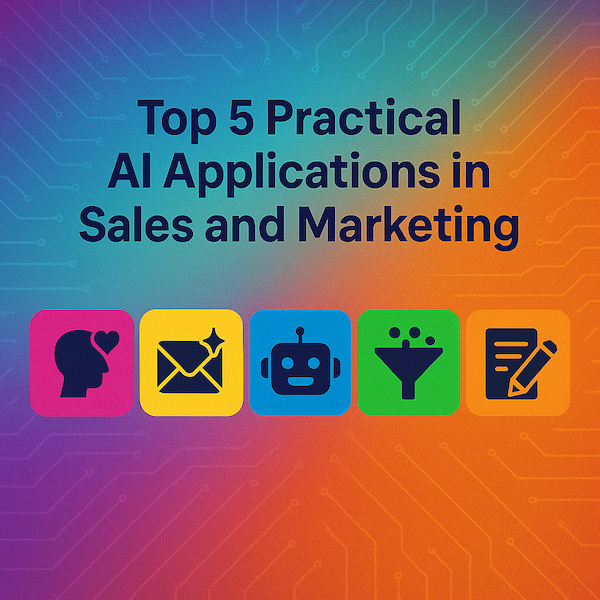Practical AI for Sales and Marketing Teams: Tools, Tips, and Becoming More Human
Life in sales and marketing is changing so fast, it is both challenging and exciting. AI tools promise to streamline routine tasks—drafting emails, conducting prospect research, and summarizing meetings—in seconds, potentially freeing up valuable time for high-impact relationship building. However, successful AI integration requires more than simply flipping a switch: it demands strategic planning, thoughtful piloting, and continuous human oversight.
The Current Landscape and the AI Mindset
According to Salesforce’s 2024 “State of Marketing” report, implementing or leveraging AI is now the top priority—and the greatest challenge—for 5,000 surveyed marketers worldwide. Yet many teams rush to deploy AI tools without first defining clear goals or understanding existing workflows. Treating AI as a fully autonomous colleague often backfires, creating inefficiencies and confusion rather than driving productivity.
On the consumer side, skepticism is rising. A recent study found that 88% of consumers would ignore emails they suspect are AI-generated, and 51% would be less likely to recommend a brand relying heavily on such communications. This underscores the need for authentic personalization—rooted in real customer insights and guided by empathetic human judgment—rather than attempting to “fake” relationships through overly generic AI output.
To harness AI effectively, teams must adopt a “plan first, experiment second” mindset. Begin by mapping current processes, identifying high-friction areas, and selecting a single pilot use case. This ensures AI becomes a powerful assistant to human teams, not a source of chaos. Below are some helpful tools and tips for integrating AI into your business processes.
Top 5 Practical AI Applications in Sales and Marketing

- Personality-Driven Outreach (Crystal Knows): Crystal Knows analyzes publicly available data to predict DISC personality profiles, offering tailored communication tips—suggesting ideal tone, phrasing, and subject lines—to improve email response rates. It integrates directly with CRMs and inboxes so that sales reps see personalized insights in their workflow. Official site.
- Email Effectiveness Coaching (Lavender AI): Lavender AI scores outbound emails on metrics such as clarity, length, and personalization, then provides real-time feedback and subject-line suggestions via a Chrome extension or inbox add-on. Users report higher open and reply rates after adopting Lavender’s recommendations. Official site.
- CRM-Powered Chatbots (ChatSpot AI): Built into HubSpot, ChatSpot AI lets teams query CRM data conversationally—requesting prospect lists, summarizing deal pipelines, or drafting personalized outreach based on real-time customer insights. It combines GPT-4 capabilities with live HubSpot records to deliver actionable responses. CMSWire overview.
- Intelligent Prospecting (Clay.com): Clay automatically enriches lead records by aggregating data from 100+ sources (job titles, social profiles, company news) and can generate personalized email drafts using that enriched context. Sales teams reduce manual research and scale relevant outreach. Official site.
- AI-Powered Content Generation (Copy.ai): Copy.ai uses advanced AI models to generate high-quality marketing copy, social media content, and email drafts. It helps teams quickly create engaging content tailored to their brand voice and audience, reducing the time spent on content creation. Official site.
AI-Powered Workflows and Agents in Slack
- Meeting Summaries & Action Items (Fireflies AI): Fireflies AI joins Zoom, Google Meet, or Microsoft Teams calls to auto-record, transcribe with over 90% accuracy, and generate searchable transcripts. Summaries and highlighted action items can be posted directly into Slack channels, ensuring no follow-ups slip through the cracks. Official site.
- Auto-Reminders & Task Tracking (Sleuth AI): Sleuth AI listens to Slack conversations, detects dates and commitments (“I’ll send that proposal by Friday”), and auto-schedules reminders in Slack or linked calendar apps. Team members can query @Sleuth AI for their upcoming tasks or project statuses, all without leaving Slack threads. It brings much of the functioonality of ChatGPT into Slack. Try if for free. Official site.
- Custom Multi-Channel Agents: Leveraging Slack’s API and webhooks, teams can build tailored AI agents that initiate complex workflows—fetching leads, enriching data in Clay, creating CRM records, and drafting personalized emails in Lavender—all triggered by a simple slash command. While AI automates the heavy lifting, human review remains critical before any mass outreach.
Validating Broader Claims is Key
- AI Requires Human Oversight: Generative AI models can produce errors, outdated information, or biased language. A recent HBR article emphasizes that responsible AI deployment demands constant human governance, clear guidelines, and regular audits to avoid unintended consequences.
- Authenticity Builds Trust: Research shows that consumers value transparency: 58% are more likely to trust a brand that discloses its use of AI in communications, and 94% demand clearer regulation and transparency around AI in marketing.
5 Tips for Getting Started with AI
- Map Your Processes: Document where your team spends the most time on repetitive, manual tasks—emails, data entry, research, or meeting summaries.
- Select a Pilot: Choose one AI tool that directly addresses your top pain point. For example, use Lavender AI to improve cold email performance, Fireflies AI to automate meeting notes or Sleuth AI to bring some of the functions of ChatGPT into Slack.
- Establish Governance: Define clear usage policies, human-in-the-loop checkpoints, and quality metrics (e.g., email reply rates, time saved).
- Train Your Team: Provide guidelines on prompt engineering, personalization best practices, and how to interpret AI feedback.
- Measure & Iterate: Track KPIs—open and reply rates, meeting follow-through, time reclaimed—and refine your processes based on real-world results.
Sources
- How Should Gen AI Fit into Your Marketing Strategy? – Harvard Business Review
- New Salesforce Report: AI is Marketers’ Top Priority – Salesforce News
- AI Emails Impact Brand Loyalty – ContentGrip
- Crystal Knows – Official site
- Lavender AI – Official site
- ChatSpot AI – CMSWire overview
- Clay – Official site
- Copy.ai -Official site
- Fireflies AI – Official site
- Sleuth AI – Official site
- Gen AI Makes People More Productive—and Less Motivated – HBR
- Authenticity in the Age of AI – Matrix Marketing Group
- Creation Myths: What Do Consumers Say About Generative AI? – StoryStream
